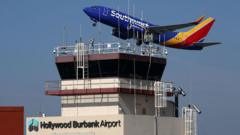In a dramatic turn of events in downtown Los Angeles, protests against President Trump’s controversial deportation roundups escalated last night, leading to confrontation with law enforcement. The protests ignited after the Trump administration ordered a significant increase in military troop deployments, raising the number of federal forces in the area to 4,000 National Guard troops and 700 active-duty Marines. As police clashed with protesters, tensions reached a boiling point, prompting California officials to announce plans to file a lawsuit against the President for the deployment.
Tensions Escalate in Los Angeles Amid Protest Over Trump’s Deployments

Tensions Escalate in Los Angeles Amid Protest Over Trump’s Deployments
California officials announce legal action against the Trump administration as troop numbers surge in response to protests.
The protest, which began peacefully earlier in the day, saw law enforcement using flash bangs and foam rounds to disperse crowds. Police and National Guard troops, donned in riot gear, surrounded federal buildings, while demonstrators began to occupy a wider area, including the nearby Little Tokyo neighborhood. This spirited movement against increased deportation efforts was marked by several injuries, including reporters caught in the chaos. Notably, Lauren Tomasi, a journalist from 9News Australia, was injured by a nonlethal round while broadcasting live, highlighting the perils faced by the press in volatile situations.
Meanwhile, in a separate announcement, Robert F. Kennedy Jr., the U.S. Health Secretary, made headlines by dismissing all members of the CDC's advisory committee on immunization, a move he claimed was necessary to regain public confidence in vaccines. The developments in Los Angeles and the broader implications of political decisions concerning public health and safety remain hot topics as tensions and responses continue to unfold throughout the week.
Meanwhile, in a separate announcement, Robert F. Kennedy Jr., the U.S. Health Secretary, made headlines by dismissing all members of the CDC's advisory committee on immunization, a move he claimed was necessary to regain public confidence in vaccines. The developments in Los Angeles and the broader implications of political decisions concerning public health and safety remain hot topics as tensions and responses continue to unfold throughout the week.





















